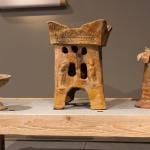The term hell is actually a transliteration of the term gahenna. The term is often used by our Lord. This is often where we get the idea of fire and such types of torment.
Various Christian universities are teaming up to offer the largest online Dante reading community in history. We are reading the Divine Comedy through next Easter. There is plenty of time to catch up and I urge you to do so.
If you are wary of great works like Dante’s because of the nuances of translation and ye olde English, I advise you to watch this one video. For each small Canto (chapter/poem) one of the professors from the institution introduces us to what we find. Our eyes are opened to the proper interpretation of the small Canto, literary nuances, historical significance, Theological truths, etc.
Watch the video and visit the site 100daysofdante.com
i. Dante’s Inferno, Canto 20
I admit, I saved this piece for now because… well it is Halloween and I find it interesting. Please know I am not speaking directly against Halloween observances in general. I believe Christian churches and Christian families should use a little old fashioned discernment when choosing what parties to attend.
If you would rather see/read a lighthearted piece on Halloween CLICK HERE
Also, this is a longread, a category of blogs more like regular articles. I am not trying to expound all my knowledge. Rather, I have encountered groups with real questions. You would be surprised what a hot topic hell is (no pun intended) even among Christians in our day.
Now, here are a couple questions we can approach Dante with, and this article
How would desperately evil witches and astrologers face everlasting torment?
What type of torment would fit their crime?
Inferno, Canto 20 with Frederic Putnam
Frederic Putnam of Templeton Honors College reflects on Canto 20 of Dante’s Inferno.
Now take a quick moment to read Canto 20 CLICK HERE
Although this is not common English, we have the great advantage of Frederic Putnam who offers a play-by-play account of what we witness in this Canto. There are a couple aspects of this Canto which resonate with me.
First, as one example I have seen palm readers on the streets, selling their “prophecies” to people in the crowd for money. In Dante’s depiction of hell, their heads are deformed and necks are wretched backwards… forever backwards.
I will leave you to read Dante’s vivid detail, but it seems both fitting and chilling to me. They will never be able to gaze forward into the future again, something they feebly attempted over and over again on earth. All their prophecy and plans have come to nought.
Second, they are silenced. For those who have truly encountered the chaos of someone who is being used as a pawn by the enemy to stir up trouble, it sometimes seems loud and chaotic. There is always something upsetting the apple cart. When the problem is addressed at the root, there is often peace and quiet again in the community… silence. Now the witches who stumble along in hell have no ability to communicate, to prophesy, to stir up dissension, etc.
ii. absurdity: a talk with a clinician
You have no reason to believe what I am sharing, and I have no reason to offer proof. In fact I feel obligated, more by my ministerial cloak than by my sociological criteria for confidentiality, to refrain from offering too much proof at all.
Nonetheless, I once again feel the gentle tug of the Holy Spirit to proceed with caution. After all, the Patheos Content Team brought me on because of my background with Pneumatology and my ministry in the Spirit. If you do not like what I have to say, at least they might.
A clinical professional was speaking to me about such matters. I was never told whether or not the person was a Christian believer and I knew better than to ask. I was simply honored someone would open up to me.
Apparently, the professional had been working with some patients who were witches. They admitted they were witches.
The clinician used various tests to assess their ailments, and also implemented holistic approaches. However x-rays were a standard part of the protocol.
The clinician put some x-rays up on the light box (display) for me to view, then pointed out their necks. The younger witches were experiencing an abnormal straightening of the discs in the neck, losing the natural curvature. Some of the older withes had neck problems beyond repair, discs fused together, straightened and stiff necks, etc.
You may wonder what else there was to the conversation, but it really was pastoral privilege. However, I will tie it in for our purposes.
iii. what does the Bible teach about the neck?
There is a term used in a major sermon in the New Testament, Stephen’s address to the Jewish leaders (many of whom are responsible for stirring up the mob to crucify Jesus Christ). Stephen calls them stiffnecked (Acts 7.51). This term is not used very often, but it is also found in Exodus, Deuteronomy, and 2 Chronicles.
The meaning is the same in both Testaments, but not quite the same as our general use of the term today. Stiffnecked means stubborn and obstinate. In the Old Testament, the term usually refers to those Israelites who rebelled against Moses. They died in the wilderness as a consequence. Therefore, stiffnecked is a little heavier term in Biblical context than the way we use it. It can mean a person who is not only stubborn, but also hardened against God.
This may not be all the Bible teaches about the neck, but we are chasing a thought.
iv. why is this important?
One of my favorite Proverbs is:
Whoever remains stiff-necked after many rebukes
will suddenly be destroyed – without remedy. Proverbs 29.1, NIV
If I remember right, an older translation reads: Whoever stiffens his neck after many rebukes will have it cut off, and that without remedy. I could be wrong. It is difficult to find those older, less politically correct Bibles. In this passage, the Biblical word for stiffnecked is the same as in the other passages.
In another passage, Samuel the Seer (Prophet… not witch) must confront King Saul.
This is an important point. There are some who truly hear from God and others who are trying to make something happen on their own.

I am not really the judge, but I am sure both types of people will stand before God for one type of reward or another
King Saul has taken his own self-made detour, invoking God in an unholy way, a problem not uncommon for witches. Saul is trying to make something happen.
Samuel pronounces judgment:
For rebellion is as the sin of witchcraft, And stubbornness is as iniquity and idolatry. 1 Samuel 15.23, KJV
Do you see it? Stubbornness is listed among the sins of rebellion, witchcraft, iniquity, and idolatry. We have to remember something. A few short generations earlier in Israel’s history, the Hebrews were commissioned by God to rid the land of pagans who were practicing these very sins.
Now King Saul is practicing the same type of sorcery?! His judgement is swift. His kingdom falls to David. He dies in battle after consulting a witch, if everything else isn’t weird enough.
I do not have all the answers. I still have questions.
Is there something to Dante’s understanding of the wrenched neck the witches have, always looking backwards in hell?
What about the x-rays the clinician showed me of the stiff necks of witches?
Is there something real to the word stiffnecked in Scripture?
v. what about Dante’s Inferno, is there anything to it?
I think there is, if we look at it through the a couple historical lenses.
First, Dante’s writings are said to be the very influential to C.S. Lewis. I think this piece of information should gain respect for Dante from many Evangelicals.
Second, I have come to see the works of people like Dante, Lewis, Tolkien, etc. as works of art. Every detail is not Canon. However, each detail can be inspired by our love for the Canon and our walk with Christ. Why not place these Christian great works in the category of a historical hymn and give it the same respect? After all, Dante’s work is poetry. It is Christian art and symbolism, something the iconoclasts constantly attempt to strip the church of.
vi. making a quick case for punishment/s in hell
Like Dante, anyone can make a case for various parts of hell from the sayings of Jesus Christ our Lord.
1) The term hell is actually a transliteration of the term gahenna. The term is often used by our Lord. This is often where we get the idea of fire and such types of torment. Jesus says some will:
be thrown into hell, where their worm never dies, and the fire is never quenched. Mark 9.47.b-48, NRSV
2) We often understand the fiery concept of hell, but there is another aspect of hell Jesus is teaching. He says, their worm never dies. In other words, there will be a constant snacking, and the person in hell is the snack.
this is quite a gruesome picture, but no one seems to question Christ’s teaching on hell
In actuality, one King of Israel in Acts allows the people to worship him. Here is what happens:
And immediately, because he had not given the glory to God, an angel of the Lord struck him down, and he was eaten by worms and died. Acts 12.23
There are two aspects of this next type of torment (Matthew 8.12; 22.13; 25:30).
The heirs of the kingdom will be thrown into the outer darkness, where there will be weeping and gnashing of teeth.
3) God will thrust some into outer darkness, put them outside His gates, an everlasting separation. Many scholars claim this will be the worst form of punishment in hell, to have known God, but now to be separated from Him.
4) There is the weeping and gnashing of teeth. This may speak of people who are very cognizant of what they have missed. For the rest of eternity, they will be in unspeakable sorrow because they turned away from what God offered through His Son.
vii. are there various levels of hell, as Dante suggests?
I cannot say, but I can say Jesus gives us different word pictures to help us understand. One thing He seems to be pointing out is, hell is a place we never want to go. I think this is part of Dante’s intent as well.
There are multiple terms in both the Hebrew and the New Testament for hell, or hellish places/aspects of the underworld. The study has fascinated me. It is one I have devoted quite a bit of time to before.
I only hope to offer something of interest here, for the sake of causing Christians to consider our Commission to reach the lost; and perhaps help the lost consider the slippery slope they could be on.












